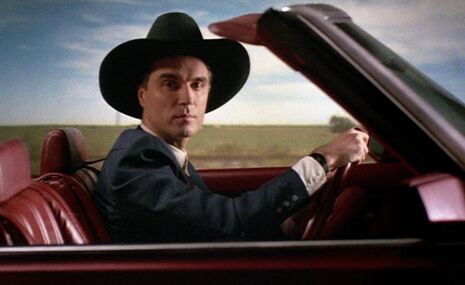Re-View: Finding value in ‘True Stories’
Reuben Andrews takes a look at a film he feels has been largely underrated, and hopes it may find higher status in the current climate. You might find it a welcome break from contemporary absurdity.

What if all the crazy stories plastered across tabloid newspapers were really true? And what if they all happened in the same place? Possible answers are the subject of cult classic True Stories, in which David Byrne, lead singer of ’80s-juggernaut Talking Heads, explores such questions in all the richness and insanity they deserve.
“For how spectacularly alien the entire community of Virgil is, their habits and mannerisms come as naturally as rain.”
The basic structure of the film concerns Byrne’s narrator, a wide-eyed wanderer so enthusiastic about Texas he’ll spend the entire 90 minutes wearing a cowboy hat, driving through the fictional town of Virgil and conducting a mockumentary on both American life and the town itself.
The people he meets are larger than life, ranging from ‘The Lying Woman’, who allegedly dated Rambo and wrote half of The Beatles’ oeuvre, to Earl Culver, Virgil’s big cheese who refuses to communicate with his wife directly, despite loving her rather dearly. In this sense, True Stories is less a traditional film and more a collection of character studies that toe the line between the real, and the absurd.
A significant slice is dedicated to exploring how the growth of technology, such as computer chips, has revolutionised the small town. Early on, a manager at the local company says, “[f]iguring something out, that’s never been understood before, is a rhythmic experience.” Although it’s schmaltzy, Byrne later upholds this positivity when discussing the development of malls: “What time is it? No time to look back.”
Often, when it comes to art about America, irony and cynicism are hard to avoid – so it’s refreshing that in True Stories, a film released during the high-watermark of post-modernism, these qualities are eschewed entirely. Instead, what the film espouses, in scenes like those at the mall, is a genuine, wholesome look at the States and its future.
In this sense it resembles an anti-Blue Velvet (which was released less than a month before): peeling back the skin of the then-present cultural landscape, but rather than exposing something malicious beneath, it reveals an almost optimistic beauty and community often foregone in contemporary media for not being edgy or exciting enough.
At times, True Stories can also come across as a proto-Wes Anderson flick, only more earnest. Here the characters are drawn with appreciation, care, and believability. They never feel like artifices, or ways for Byrne to shoehorn in a quirky line - they are simply themselves. And for how spectacularly alien the entire community of Virgil is, their habits and mannerisms come as naturally as rain.
Of course, there are moments of pathos between the kitsch, lest the syrupy nature become sickening. These almost all revolve around Louis Fyne, the narrative and emotional centre of True Stories (who is portrayed by John Goodman in one of his first major roles). A bachelor who maintains a “very consistent panda-bear shape”, Louis is on the prowl for matrimony. His arc ends with the performance of a song he has written at the looming ‘Celebration of Special-ness’. Does Louis finally find a wife? I’ll let you find out yourself. But Goodman’s performance – including his song – is worth the price of admission alone.
True Stories doesn’t say anything particularly deep or challenging; it merely reminds its audience to be optimistic and to appreciate the absurdity of modern life. As our narrator tells us at the film’s close, he enjoys forgetting, as familiarity breeds complacency, and only “by forgetting can [one] see the place again, as it really is.” The film is not only an impetus to once again consider the things you overlook every day, but also a momentary lapse in the ever-pervasive cynicism and pessimism of contemporary media. Give it a watch – you won’t regret it
 News / Uni Scout and Guide Club affirms trans inclusion 12 December 2025
News / Uni Scout and Guide Club affirms trans inclusion 12 December 2025 News / Cambridge Vet School gets lifeline year to stay accredited28 November 2025
News / Cambridge Vet School gets lifeline year to stay accredited28 November 2025 News / Cambridge study finds students learn better with notes than AI13 December 2025
News / Cambridge study finds students learn better with notes than AI13 December 2025 Science / Did your ex trip on King’s Parade? The science behind the ‘ick’12 December 2025
Science / Did your ex trip on King’s Parade? The science behind the ‘ick’12 December 2025 News / Pembroke to convert listed office building into accom9 December 2025
News / Pembroke to convert listed office building into accom9 December 2025







